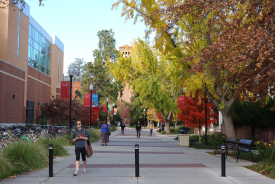Two recent reports from education technology firms, Anthology and Chegg, shed light on the underwhelming adoption of artificial intelligence (AI) among students and university leaders in the United States compared to their global counterparts.

Student AI Usage: U.S. Lags Behind, UK Shares the Bottom
According to Anthology's report, only 38 percent of U.S. students reported using AI at least monthly, placing the country second to last, with the United Kingdom having an even lower usage rate. Chegg's global study echoed these results, revealing that 20 percent of U.S. students reported using generative AI, with the UK trailing closely at 19 percent.
Contrastingly, over 30 percent of U.S. university leaders surveyed by Anthology expressed concerns about the ethics of AI, specifically its potential role in plagiarism. This suspicion level surpassed that of leaders in any other country except the U.K., indicating a higher degree of caution within the U.S. academic leadership.
Mirko Widenhorn, senior director of engagement strategy for Anthology, sees the lower AI usage as an opportunity for U.S. university leaders. He suggests that the relatively slower adoption provides a valuable window for leaders to assess the AI landscape and deepen their understanding of its effective application.
Anthology's survey, conducted in August, involved approximately 2,600 university leaders and 2,700 students across 11 countries. Chegg's global study, also conducted in August, polled around 11,000 undergraduate students across 15 countries. Both surveys aimed to gauge perspectives on AI usage, concerns, and expectations in higher education.
READ ALSO : How Much Does It Cost To Study In The US?
Divergence in Student Engagement and Views on AI
While both reports touched on students' thoughts regarding generative AI, different takeaways emerged. Anthology's study highlighted U.S. students' more favorable opinion of AI's potential to boost student engagement and interactivity, with 46 percent citing it as AI's top use, surpassing global peers. This optimism could be linked to U.S. students' familiarity with AI chatbots, despite the overall low usage of generative AI.
Both U.S. students and university leaders showcased a surprising focus on AI's potential for student engagement. Over 30 percent of leaders in the Anthology survey believed AI could enhance student engagement, ranking it as the top use case, followed by generating ideas and revolutionizing teaching and learning. This consensus indicates a shared vision for improving the overall student experience using AI.
Anthology's survey unveiled several disparities between university leaders and students. While over 50 percent of U.S. students anticipate their AI usage increasing in the next six months, only 3 percent of leaders consider themselves "frequent" users of AI. Additionally, more than 30 percent of U.S. leaders expressed concerns about AI being unethical, particularly its role in potential plagiarism.
Human Expertise and Curriculum Evolution
Chegg's study added a global perspective, revealing that 55 percent of respondents worldwide advocated for human expertise in generating answers. While 40 percent of students globally use AI, nearly half are concerned about receiving incorrect information. A notable 65 percent believe universities should alter their assessment methods due to the widespread availability of AI. Similarly, 65 percent express the desire for AI training in the curriculum to better prepare for future careers.
The reports highlight the evolving landscape of AI adoption in U.S. higher education, emphasizing the need for a comprehensive understanding of AI's potential benefits and ethical considerations. As the world advances into an era increasingly intertwined with AI, U.S. institutions have an opportunity to catch up, reassess, and strategically integrate AI to enhance the learning experience for students.
© 2025 University Herald, All rights reserved. Do not reproduce without permission.








